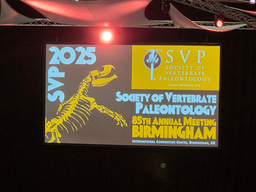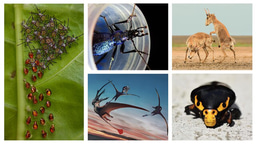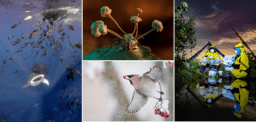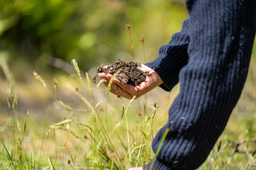Introducing BMC Ecology and Evolution's new Collection: Evolutionary Biology and Ecology of Cancer
Published in Ecology & Evolution

BMC Ecology and Evolution welcomes submissions of experimental, mathematical and conceptual articles applying the knowledge, methods and concepts of evolution and ecology to help further our understanding of cancer and its management. The Collection will consider manuscripts using evolutionary biology and ecology principles to:
- Understand the natural history of the disease
- Analyse and integrate the multilevel evolutionary processes and selection pressures
- Identify the knowns and unknowns when mapping cellular (epi)genotypes to clinical phenotypes
- Study tumour microenvironments
- Infer (epi)genetic cellular branching processes resulting in distinct cancer cell lineages
- Study transmissible and infectious cancers
- Study molecular and cellular competition, cooperation and conflict
- Study the emergence and spread of therapeutic resistance
- Study the role of stochasticity and molecular-cellular noise in the establishment and evolution of the disease
The aim is to foster cross-talk between eco-evolutionary and oncology perspectives to advance our understanding of cancer.
Meet the Guest Editors
Ignacio González Bravo, CNRS Montpellier, France
Dr Ignacio González Bravo is a biochemist by training with a PhD in molecular microbiology studying the evolution of bacterial polysialic capsules. Ignacio was introduced to cancer research during his postdoc years at the German Cancer Research Center in Heidelberg, working on the emergence and function of viral oncogenes. Ignacio later worked on the interface between cancer epidemiology and viral diversity and evolution, first as the head of the Infections and Cancer Laboratory at the Catalan Institute of Oncology and now as Research Director at the French National Center for Scientific Research in Montpellier. Ignacio uses viral induced-cancers as an experimental model. His main research program advocates for the introduction of evolutionary thinking as a central element in understanding the proximate and ultimate origins of cancer: from molecular mechanisms and functions to adaptation, from the natural history of the infection in the patient to the evolution of cancer susceptibility across species.
David Basanta, Moffitt Cancer Center, USA
David Basanta is an Associate Member at the Moffitt Cancer Center in Tampa, Florida. He is part of the Integrated Mathematical Oncology department and holds a courtesy appointment at the genitourinary oncology department. His group, CancerEvo, studies the role of cancer evolution in driving cancer progression and resistance to treatment. While intra tumor heterogeneity and genetic mutations are key aspects of somatic evolution, selection is driven by the ecosystem that cancer cells inhabit. CancerEvo’s research combines data from pre-clinical models and patients together with first-principles computational models to explore evolution and the ecosystem in the context of treatment.
Submission guidelines
This Collection will consider research, database and software articles. Review articles will be considered at the discretion of the Journal’s Editor. If you would like to submit a review article, please first email Jennifer Harman <jennifer.harman@springernature.com> - the Editor of BMC Ecology and Evolution. Please note that unsolicited reviews will not be considered as per our submission guidelines.
Datasets, descriptions and short reports relevant to the Collection will be considered by BMC Research Notes as data or research notes. This type of content will be published in BMC Research Notes and included in the final collection.
Articles under consideration for publication within the collection will be assessed according to the standard BMC Ecology and Evolution editorial criteria and will undergo the journal’s standard peer-review process overseen by Guest Editors Dr Ignacio González Bravo (CNRS Montpellier, France) and Dr David Basanta (Moffitt Cancer Center, USA).
Before submitting your manuscript, please ensure you have read our submission guidelines. Articles for this Collection should be submitted via our submission system, Snapp. During the submission process you will be asked whether you are submitting to a Collection, please select "Evolutionary Biology and Ecology of Cancer" from the dropdown menu.
If accepted for publication, an article processing charge applies. Please click here to find out about our standard waiver policy.
The deadline for submissions is the 18th of October 2023.
Follow the Topic
-
BMC Ecology and Evolution

An open access, peer-reviewed journal interested in all aspects of ecological and evolutionary biology.
Related Collections
With Collections, you can get published faster and increase your visibility.
Bioacoustics and soundscape ecology
BMC Ecology and Evolution welcomes submissions to its new Collection on Bioacoustics and soundscape ecology. By studying how animals use sound and how noise impacts them, you can learn a lot about the well-being of an ecosystem and the animals living there. In support of the United Nations Sustainable Development Goals (SDGs) 13: Climate action, 14: Life below water and 15: Life on land, the Collection will consider research on:
The use of sound for communication
The evolution of acoustic signals
The use of bioacoustics for taxonomy and systematics
The use of sound for biodiversity monitoring
The impacts of noise on animal development, behavior, sound production and reception
The effect of anthropogenic noise on the physiology, behavior and ecology of animals
Innovative technologies and methods to collect and analyze acoustic data to study animals and the health of ecosystems
Reviews and commentary articles are welcome following consultation with the Editor
(Jennifer.harman@springernature.com).
Publishing Model: Open Access
Deadline: Mar 27, 2026
Ecology of soils
BMC Ecology and Evolution invites researchers to submit their work on soil ecosystems and their implications for environmental sustainability. Soils are living, dynamic systems that support a vast array of organisms, from tiny microbes to plants and animals. They play a vital role in keeping our planet healthy by recycling nutrients, storing carbon, and helping regulate water and climate. Understanding how soil life functions and adapts is essential for tackling major environmental challenges like climate change, habitat loss, and soil degradation.
This collection of articles aims to showcase the latest research in soil ecology, emphasizing the interactions among soil organisms, biogeochemical processes, and ecosystem functions across various landscapes. We invite submissions that explore the following topics:
•Microbial and faunal diversity in soils: Patterns, drivers, and functional roles of bacteria, fungi, protists, and invertebrates
•Soil biogeochemistry and ecosystem functioning: Nutrient cycling, carbon sequestration, and soil health in both natural and managed ecosystems
•Soil-plant interactions: Rhizosphere processes, plant-microbe symbioses, and their effects on vegetation dynamics
•Land use and climate change impacts on soil communities: Responses of soil biodiversity and functions to agricultural intensification, urbanization, pollution, and climate shifts
•Soil metagenomics, phylogenetics, and functional ecology: Advances in molecular approaches for studying soil microbial and faunal communities
•Conservation and restoration of soil ecosystems: Strategies for maintaining soil biodiversity and ecosystem services in degraded landscapes
All manuscripts submitted to BMC Ecology and Evolution, including those submitted to collections and special issues, are assessed in line with our editorial policies and the journal’s peer review process. Reviewers and editors are required to declare competing interests and can be excluded from the peer review process if a competing interest exists.
This Collection supports and amplifies research related to SDG 15: Life on Land.
Publishing Model: Open Access
Deadline: Jun 02, 2026






Please sign in or register for FREE
If you are a registered user on Research Communities by Springer Nature, please sign in